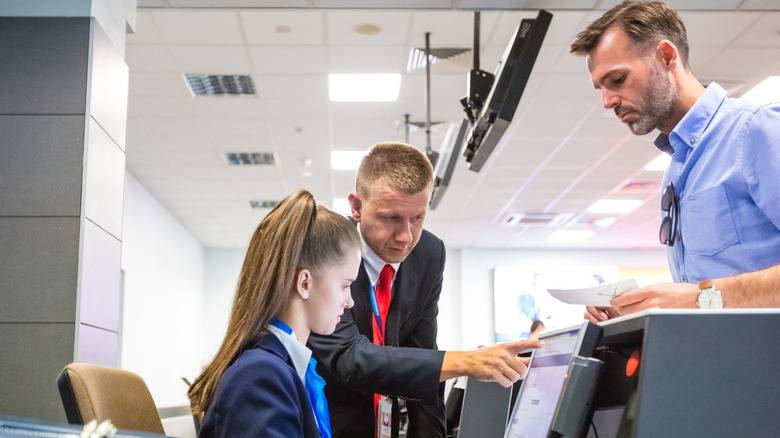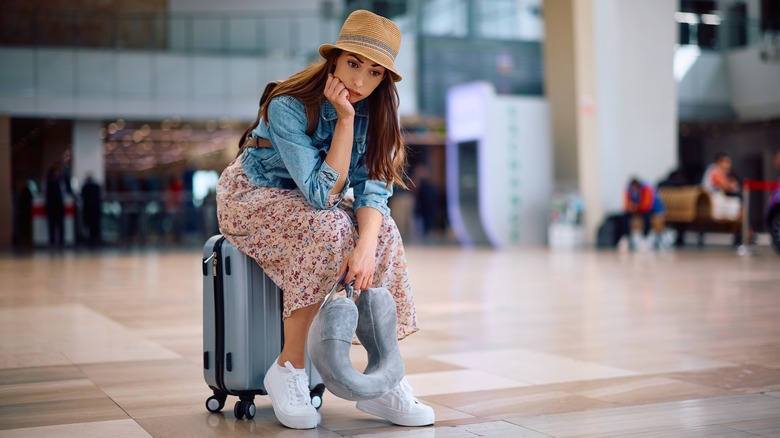What Really Happens If You Have The Same Name As Someone On The No-Fly List?
It goes without saying that being added to a no-fly list can seriously jeopardize your chances of traveling. You typically won't be allowed to check in for a flight, and you can be disqualified or suspended from TSA PreCheck and other travel-related services. And because the list is maintained at the federal level, it applies to all U.S. flights, no matter what airport you're departing from.
The U.S. government keeps details about the no-fly list under wraps, and it's not always clear why people end up on it. However, suspicious or violent activity is often the reason travelers get blacklisted. For instance, associating with terrorist groups, committing crimes related to terrorism, or being wanted by law enforcement are a few explanations for ending up on the no-fly list.
There's another surprising reason you might be barred from flying, according to Neama Rahmani, former federal prosecutor and president of West Coast Trial Lawyers. As the expert exclusively shared with Explore, simply having the same name as someone on the no-fly list could cause problems when you attempt to travel by plane. "You may not be able to board a flight into, out of, or within the United States," he revealed.
How to know if your name landed you on the no-fly list
Being identified as a suspected terrorist simply because of a name mix-up might seem unlikely, but it's happened to travelers before. CBS News' "60 Minutes" aired a segment in 2006 featuring the stories of a group of men named Robert Johnson who faced scrutiny and long interrogations when flying. The apparent reason? They shared a name with a man who had been convicted of plotting a bombing in Toronto and had been added to the no-fly list.
Unfortunately, it's not always so easy to find out if mistaken identity is the reason you're interrogated before a flight or required to take part in additional airport screening. "The no-fly list is not public and you wouldn't know whether you're on it until you attempt to fly," Neama Rahmani explained. Similarly, there's no way to search other people's names to determine who's on the list.
Still, there are some signs to look out for, such as being refused a boarding pass. With that said, don't panic if you have trouble checking in at the airport or are bumped from a flight. Remember, there are a lot of unexpected things airlines are allowed to do, such as removing passengers from overbooked flights, that have nothing to do with the no-fly list. Each air carrier is also allowed to manage its own separate no-fly list based on bad in-flight conduct, and ending up on one airline's list doesn't necessarily mean you're banned by all.
What to do if you share a name with someone on the no-fly list
Typically, the no-fly list indefinitely blocks travelers from flights to and from the U.S. However, if you believe you've been mistaken for another offender and wrongfully added to the list, Neama Rahmani says it's possible to appeal the decision in an attempt to clear your name. "You should try to show that you are a different person than the individual on the no-fly list by showing an ID with a different middle name or different date of birth," the lawyer suggested. Any evidence to show that you're a different person can help your case.
Rahmani added that there's an official procedure in place where you can complete an application with the Department of Homeland Security to receive a redress control number. "A redress number will help the airline know that you're not the person on the no-fly list," he shared. Think of the number as another way to identify yourself and set yourself apart from others with the same name. Once you've received a redress control number, Rahmani says to enter it in your booking when reserving airline tickets to avoid being turned away on flight day.


